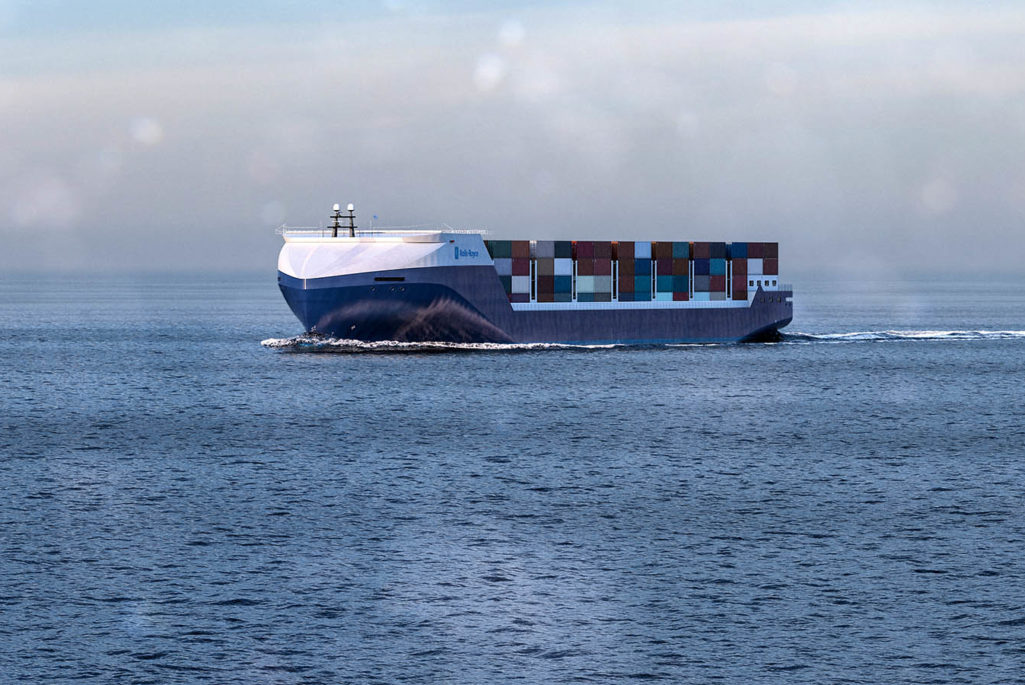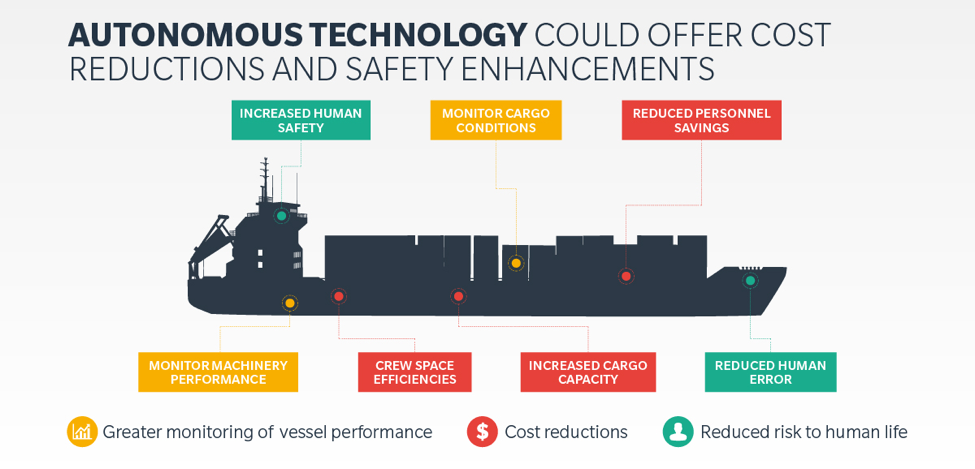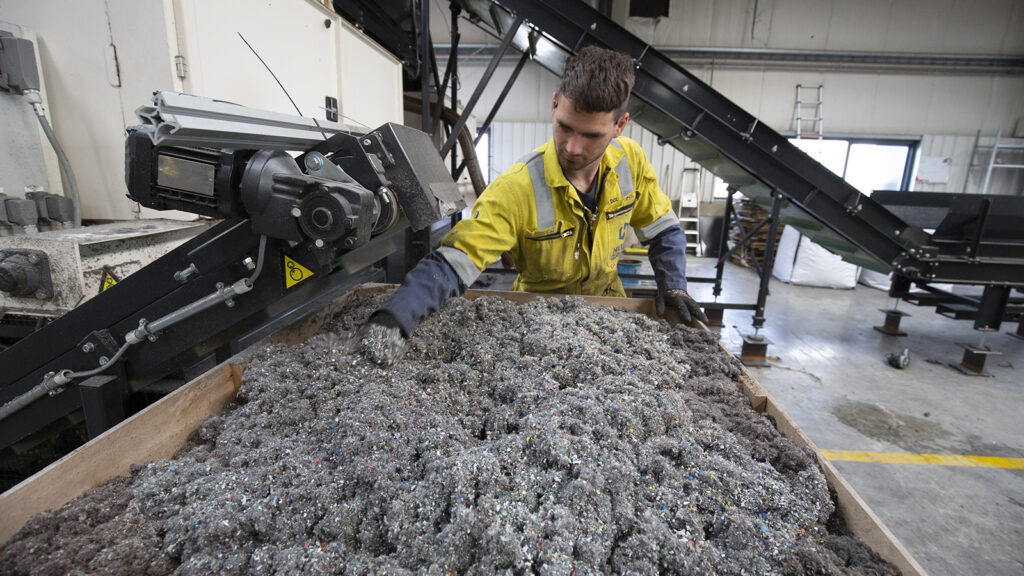‘Drone Ships’ Will Bring New Risks and Rewards

Artist's mock up of an autonomous cargo ship at sea.
Illustration: Rolls Royce/Flickr/CC
Crewless, fully autonomous ships (sometimes referred to as “drone ships”) have yet to navigate global waters, but research and development are progressing on a number of fronts. At the same time, debate about the legal implications is moving to the forefront.
Interest is driven by a combination of rising transport volumes, growing environmental concerns, an ever-present focus on cost reduction, a looming shortage of experienced and qualified seafarers, and the rapid technological evolution that now touches every industry.
The steps now being taken in developing autonomous and smart technology in shipping could someday make fully autonomous shipping a reality. Consider that shipping research firm DNV GL unveiled its plans for a crewless cargo ship as far back as 2014. Meanwhile, the Norwegian government has designated an area for testing autonomous technology in ships, paving the way for further research into the adoption of these ships.
Rolls-Royce Plans for Fully Autonomous Ship
Among the companies leading the way on autonomous shipping is Rolls-Royce, which announced plans to have a remotely controlled, local vessel operating by 2020 with a fully autonomous ship some 15 years later. The company said the ships will be cheaper and safer to operate and will be able to carry more cargo than their crewed counterparts. The ship would be controlled by a captain in an onshore command center, with some aspects of operation and navigation automated. The company said it is drawing on experience and advances from technology areas including driverless cars, sensors, connectivity, and communications.
Legal Issues and Other Risks
As with any advance in technology, legal and regulatory approvals will be among the first hurdles in making autonomous shipping a reality. The legal debate has become fertile ground for maritime lawyers. For example, consider what’s known as “negligence of master, officers and crew.” This is a covered peril under British and American marine insurance hull clauses, provided that such negligence has not resulted from a lack of due diligence by the assured, owners or managers. Thus deciding whether a “captain” sitting at a desk in Copenhagen would be legally/officially part of a “crew” is likely to be viewed differently by various legal jurisdictions as they apply the law to insurance claims for physical loss or damage to the ship.
That’s only the start of the legal issues. What status should be given the programmer who designed the computer system that runs the autonomous ship? Where does liability fall? With fully automated vessels, could ship owners claim coverage for loss or damage to the vessel caused by the negligence of programmers?
These are debates that the insurance industry needs to have before people start ordering these vessels.
Beyond the legal issues, other traditional and emerging risks will need to be considered and mitigated by ships’ operators. A survey conducted by SAFETY4SEA among maritime stakeholders assessed the challenges associated with the use of autonomous ships and found that navigational risk, cybersecurity and loss of communication were considered to be the greatest challenges facing the development of fully autonomous ships.
Safety, Vessel Performance and Savings
While fully autonomous shipping may be years away, more immediate implications will be felt by the industry around data transfer, communication, navigation, surveillance, and repair/maintenance. Advances in these areas could improve shipping efficiency and reduce the impact of external threats, human error and operational costs.
Greater monitoring of vessel performance: New and emerging technology can be used in the shipping industry to remotely monitor conditions of the cargo on board the ship and help to raise any issues more quickly. As a result, the possibility for litigation with cargo owners if cargo arrives damaged or ruined would be reduced.
Some shipping lines already use similar technology to monitor the performance of the vessel’s engines, while other machinery is constantly monitored by its manufacturers. This is often done from offices located on the other side of the world, where it is possible to detect the failure of parts or identify excessive wear to avoid breakdown.
Cost reductions: If remotely controlled ships are brought into use, one of the key benefits to the industry would be the resulting cost reductions. These ships would require fewer personnel and less fuel to complete journeys.
If a vessel is fully autonomous, it would eliminate the need for crew facilities—such as sleeping quarters—on board. This would lead to more space for cargo carriage, which would mean increased profitability for shipping companies using these vessels.
Reduced risk to human life: Without navigation and engineering personnel on board, these ships might also achieve the benefit of increased human safety. The ship would be largely, if not entirely, controlled from a remote location, meaning the risk to human life from accidents or the loss of the ship would be reduced.
In addition, the possibility for human error, which is widely thought to be a contributing factor in more than 70 percent of all accidents at sea, may be reduced if systems are more automated.
Murky Waters to be Tested
The move toward greater automation in the shipping industry is inevitable; however, we predict that technology such as this is unlikely to completely replace traditional cargo ships in the foreseeable future. Instead, the technology is likely to be used on short shuttle service journeys. For example, ferry operations could be an area where fully autonomous vessels may be commercially viable at some point.
The uncertainty regarding the safety of autonomous ships compared to traditional cargo ships will be tested over time. If legal issues can be overcome and the technology is found to be viable, the support of regulators, financial institutions, and customers will be essential to the deployment of these ships in everyday commercial activities.











